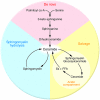Ceramides as modulators of cellular and whole-body metabolism
- PMID: 22045572
- PMCID: PMC3204836
- DOI: 10.1172/JCI57144
Ceramides as modulators of cellular and whole-body metabolism
Abstract
Nearly all stress stimuli (e.g., inflammatory cytokines, glucocorticoids, chemotherapeutics, etc.) induce sphingolipid synthesis, leading to the accumulation of ceramides and ceramide metabolites. While the role of these lipids in the regulation of cell growth and death has been studied extensively, recent studies suggest that a primary consequence of ceramide accumulation is an alteration in metabolism. In both cell-autonomous systems and complex organisms, ceramides modify intracellular signaling pathways to slow anabolism, ensuring that catabolism ensues. These ceramide actions have important implications for diseases associated with obesity, such as diabetes and cardiovascular disease.
Figures



References
-
- Polya JB, Parsons RS. Free ceramide in blood and its relevance to atherosclerosis. I. Med J Aust. 1973;1(18):873–879. - PubMed
Publication types
MeSH terms
Substances
LinkOut - more resources
Full Text Sources
Other Literature Sources

